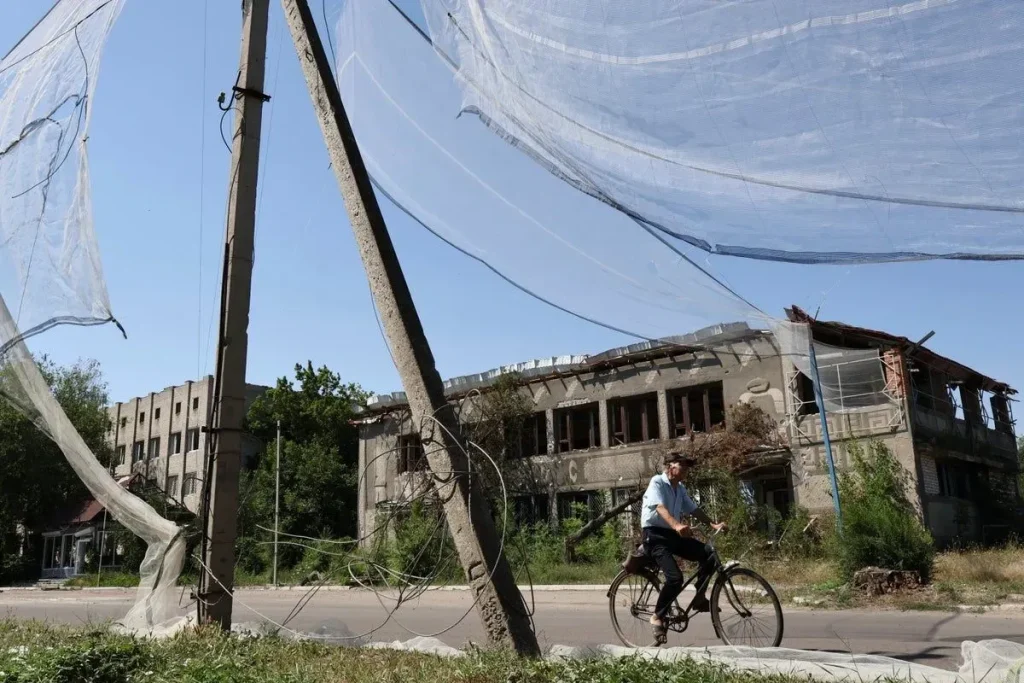Russia attacks Ukraine with extensive military force, launching a wave of attacks aimed at crippling the nation’s energy infrastructure, as reported by Ukrainian President Volodymyr Zelenskyy. Over the course of a single night, Russian forces targeted six regions, resulting in casualties that included a child and dozens of injuries among civilians. This aggressive strategy has raised urgent questions about the adequacy of U.S. military aid to Ukraine and the ongoing support from NATO allies. Amidst this turmoil, the geopolitical landscape shifts, especially with the contrasting Trump Ukraine policy that emphasizes a controversial 50-day ultimatum for a peace deal. As the situation escalates, Zelenskyy’s response to Russia only underscores the grave implications for international relations and regional stability.
The ongoing conflict between Russia and Ukraine has erupted into a new phase of aggression, characterized by significant military offensives that focus on key targets. These hostilities mark a critical juncture for Ukraine, prompting discussions around international intervention and support. In light of this, the response from key figures, including Zelenskyy and the intricacies of foreign policy, particularly Trump’s stance, plays a pivotal role in shaping the narrative. Furthermore, the implications for Ukraine’s energy sectors and the level of NATO backing highlight the complexities of a crisis that continues to unfold on the world stage. As the international community watches closely, the urgent need for a cohesive strategy becomes ever more apparent.
The Escalating Conflict: Russia Attacks Ukraine
In yet another escalation of the conflict, Russia has launched extensive attacks on Ukraine, targeting vital energy infrastructure across multiple regions. Ukrainian President Volodymyr Zelenskyy has confirmed that these attacks involved hundreds of missiles and drones, leading to significant casualties and infrastructural damage. This military offensive comes at a critical time, amid discussions of U.S. military strategies and support for Ukraine. With a focus on long-range targeting, the attacks threaten to destabilize Ukraine further and hinder ongoing efforts for peace.
The situation underscores the dire need for immediate reinforcements in Ukraine’s defense systems, as Zelenskyy emphasized the urgency of bolstering aerial protection. An effective counter-strategy is crucial to mitigating the severe impacts of these attacks, especially as energy infrastructure is a prime target in these offensives. Global support, particularly from NATO, is being called upon to address this challenge promptly.
Trump’s Response to Ukraine: Mixed Signals
Former President Donald Trump’s remarks concerning Ukraine have raised eyebrows, especially after he suggested that Ukraine should not target Moscow in its military strategy. This statement contrasts sharply with earlier conversations reported by the Financial Times, suggesting that Trump had encouraged deeper strikes into Russia. Such conflicting messages create confusion not only in Ukraine but also among U.S. allies who are keen on a cohesive approach to supporting Ukraine in its conflict against Russia.
Scholars and analysts have criticized Trump’s approach, viewing it as a potential stumbling block in the already convoluted geopolitics of the region. The paradox of advocating for peace talks while simultaneously implying leniency toward Russian aggression and military actions can undermine diplomatic efforts and signals to both allies and adversaries. Therefore, a clear and unified stance from U.S. leadership is essential for establishing a robust response to ongoing threats.
Impact on Ukraine’s Energy Infrastructure
The recent missile strikes have had a catastrophic impact on Ukraine’s energy infrastructure, cutting power to tens of thousands of families and disrupting essential services. Ukraine’s largest energy provider, DTEK, reported significant damage to infrastructure in areas like Kryvyi Rih, highlighting the strategic importance of energy assets in the ongoing conflict. Such targeted attacks are indicative of a broader strategy aimed at crippling Ukraine’s ability to sustain itself amid the war.
As winter approaches, the urgency of repairs and fortification of energy systems cannot be overstated. This presents an immediate challenge for both the Ukrainian government and its international allies, emphasizing the need for increased support in the form of military aid and logistical assistance. President Zelenskyy’s repeated calls for enhanced protection and resources signal a critical juncture in the war, where energy security directly impacts national resilience.
Zelenskyy’s Call for NATO Support
In the wake of the recent Russian attacks, President Zelenskyy has turned to NATO for increased support, urging the alliance to acknowledge the severity of the threat posed by Russian aggression. Highlighting the need for advanced military technology, particularly air defense systems like Patriot missiles, Zelenskyy’s appeal reflects a desperate bid to enhance Ukraine’s defensive capabilities. The support from NATO is crucial not only for immediate military needs but also for long-term strategic stability in the region.
Zelenskyy’s leadership during these trying times resonates with not just the Ukrainian populace but also with allies who are observing the war’s progression keenly. Echoing sentiments shared by several NATO representatives, the necessity for unified military aid is more pertinent than ever as Russia continues to exhibit a blatant disregard for international norms. Securing NATO’s support could potentially shift the balance of power and provide Ukraine with a more formidable defense against ongoing assaults.
International Reactions to Trump’s Ultimatum
The international community’s response to Trump’s 50-day ultimatum for a ceasefire with Russia has been mixed, with many expressing concern over the implications of such a proposal. Critics argue that providing an ultimatum to a regime that has consistently demonstrated aggression enables further escalation rather than fostering genuine efforts toward peace. The apprehension among European officials suggests a lack of confidence in a strategy that might offer Putin the opportunity to regroup and strengthen his military posture in Ukraine.
On the other hand, some view Trump’s approach as an attempt to find a middle ground that could potentially stabilize the situation, albeit this perspective is overshadowed by skepticism. The nuances in diplomatic negotiations require careful consideration, and leaders must balance the need for a firm response with the complexities of achieving a ceasefire. Moving forward, establishing a clear path of support for Ukraine while holding Russia accountable remains imperative.
The Role of U.S. Military Aid in Ukraine’s Defense
U.S. military aid has emerged as a fundamental pillar in Ukraine’s defense strategy against Russian aggression. The recent announcements regarding the shipment of advanced weapon systems, including Patriot air defense technology, signify a robust commitment to bolster Ukraine’s military capabilities. This military support not only enhances the immediate capacity of Ukrainian forces but also serves as a strong deterrent against further Russian advances, showcasing collective resolve among NATO allies.
The relationship between U.S. support and Ukraine’s defensive success cannot be overstated. As Zelenskyy has noted, timely and effective military aid plays a crucial role in countering the extensive military tactics employed by Russia. Continuous support from the U.S. and other NATO members is critical to ensuring that Ukraine can sustain its defense and work towards regaining territorial integrity amid ongoing hostilities.
Potential Consequences of Trump’s Tariff Proposals
Trump’s recent statement regarding the imposition of 100% tariffs on countries purchasing Russian goods could have significant implications for international relations and global markets. This move is seen as a direct response to Russia’s continued aggression and is aimed at crippling the economic capabilities of the Kremlin. However, the success of such measures will depend largely on global compliance and the willingness of allies to enforce these tariffs, which could strain diplomatic ties.
The economic fallout from such tariffs may also have unintended consequences for countries that rely on Russian energy resources. The intricacies of global trade necessitate a careful approach to sanctions and tariffs, as they can impact not just the aggressor but also allied nations. Thus, while the proposal aims to punish Russia, it is essential that the U.S. considers the broader ramifications for international economic stability.
The Importance of a Unified International Strategy
As the situation in Ukraine remains volatile, the importance of a unified international strategy to combat Russian aggression cannot be overstated. Global responses need to be coordinated in order to effectively support Ukraine and deter further escalation. This involves not only military support but also a synchronized approach to sanctions, diplomatic negotiations, and humanitarian aid. The complexity of the conflict calls for clear objectives and a cohesive plan that aligns all parties involved.
Without a unified front, the risk of miscommunication and disparate strategies could undermine the collective efforts needed to stabilize the region. Engagement from both NATO members and non-member states is crucial in affirming solidarity with Ukraine and demonstrating a collective resolve against threats to sovereignty. The global community must work tirelessly to foster an environment where peace negotiations can occur, ensuring that Russia is held accountable for its actions.
Future Prospects for Peace in Ukraine
Looking ahead, the prospects for peace in Ukraine seem fraught with challenges, especially amid ongoing military escalations and complex geopolitical dynamics. Diplomatic efforts will require not only a cessation of hostilities but also a commitment to addressing the root causes of the conflict. Engaging both sides in meaningful dialogue will be essential, particularly as the situation evolves and new developments arise.
Moreover, the role of key stakeholders—be it the U.S., NATO, or other international bodies—will play a pivotal role in shaping the path forward. Establishing a framework for sustainable peace requires patience, strategic negotiation, and a willingness to compromise. As the international community rallies to support Ukraine, it is imperative to cultivate an atmosphere conducive to lasting resolution and reconciliation.
Frequently Asked Questions
What triggered Russia’s massive attacks on Ukraine recently?
Russia launched massive attacks targeting Ukraine’s energy infrastructure as reported by President Volodymyr Zelenskyy. This escalation included hundreds of missile and drone strikes across six Ukrainian regions, leading to casualties and power outages.
How has Zelenskyy responded to the ongoing Russian attacks on Ukraine?
In response to the large-scale Russian attacks, President Zelenskyy emphasized the need for increased protection for Ukraine, calling for more aircraft and interceptors to effectively counter the threats posed by Russia.
What role does U.S. military aid play in supporting Ukraine during Russian attacks?
U.S. military aid has been crucial in supporting Ukraine amid the Russian attacks. Recent announcements included the provision of top-tier weapons such as Patriot missiles, which are essential for Ukraine to enhance its air defense capabilities.
How did Trump’s comments on Ukraine’s military strategy impact the conflict with Russia?
President Trump’s suggestion to Ukraine regarding attacks on Moscow created controversy, especially as the Russian attacks intensified shortly after. His call for not targeting Moscow contrasts with earlier discussions about encouraging deeper strikes into Russia.
What is NATO’s position regarding the ongoing conflict and support for Ukraine?
NATO has expressed strong support for Ukraine in light of the Russian attacks. This support includes the provision of advanced weapons and military assistance to bolster Ukraine’s defenses against ongoing aggression.
Why was there criticism surrounding Trump’s 50-day ultimatum for a peace deal with Putin?
Trump’s 50-day ultimatum for a peace deal faced criticism as many European officials questioned why he was offering additional time to Putin, whose intentions to dominate Ukraine remain clear amid ongoing attacks.
What impact do Russian attacks on Ukraine have on civilian infrastructure?
The Russian attacks on Ukraine have severely impacted civilian infrastructure, resulting in power outages affecting tens of thousands of families and causing casualties among civilians, including a child.
How has the international community reacted to Russia’s attacks on Ukraine?
The international community, including the U.S. and NATO, has reacted to Russia’s attacks by reaffirming support for Ukraine through military aid and by condemning Russia’s aggressive actions.
| Key Point | Details |
|---|---|
| Russia’s Massive Attacks | Russia launched large-scale drone and missile strikes targeting energy infrastructure across six Ukrainian regions. |
| Casualties and Damage | At least two people were killed, including a child, and 25 others injured. Power outages affected 80,000 families in multiple regions. |
| Trump’s Ultimatum | President Trump suggested a 50-day ultimatum for Russia to agree on a peace deal while later backtracking on comments encouraging Ukraine to attack Russia. |
| US Military Support | Trump announced the sale of advanced weapon systems, including Patriot missiles, to NATO allies for use in Ukraine. |
| Criticism and Reactions | European officials criticized the ultimatum, while Russian spokesperson dismissed the intentions behind US military aid. |
Summary
The ongoing conflict characterized by Russia’s attacks on Ukraine highlights the critical situation in the region. As Russia launched massive attacks late at night, targeting key energy infrastructure and resulting in fatalities and widespread power outages, the situation escalated. President Trump’s mixed messaging regarding military strategies and timelines for negotiations adds complexity to the geopolitical landscape. With the international community watching closely, the dynamics of Russia attacks Ukraine remain precarious as leaders navigate the challenges of diplomacy and military engagement.



